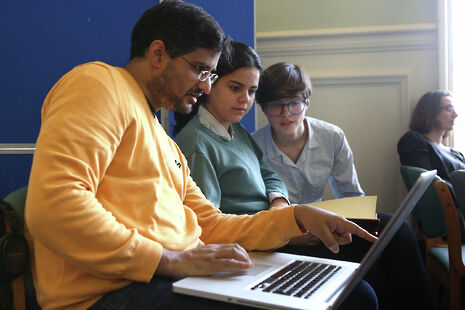Newnham hosts edit-a-thon to ‘make the internet less sexist’
Attendees took part in a Wikipedia edit-a-thon to raise the profile of inspirational women online

Members of the University and wider Cambridge community gathered at Newnham College on Wednesday to hold a Wikipedia edit-a-thon in celebration of International Women’s Day.
Over the course of the day, around 80 attendees were encouraged to “make the internet less sexist” by updating the Wikipedia profiles of inspiring women, or creating new pages for women who had previously been overlooked.
The event was arranged in collaboration with Wikimedia UK, a charity which supports and promotes the various branches of Wikipedia, as part of the organisation’s ‘Women in Red’ campaign. It aims to draw attention to the fact that, whereas Wikipedia uses blue hyperlinks in its entries to connect users to other related pages, many names of prominent women appear in red, signalling that a biography is required but has not yet been created. Supporters are encouraged to write these missing biographies, so that more information is available about the lives and work of influential women.
One such woman is Italia Conti, an English actress who founded the prestigious Italia Conti drama school in London. No biography page existed for Conti until a student from a school group taking part in the event noticed the omission and created a page in her name.
Roger Bamkin, former Chair of Wikimedia UK and founder of Women in Red, explained to Varsity the scale of the recognition problem faced by women like Conti: of the 1.25 million biographies which feature on Wikipedia, only 15.5 per cent were women when the campaign was set up. Currently, this figure is at 16.6 per cent. Bamkin acknowledged that this seems only to be a minor improvement, but stressed that with 1 billion people viewing the new biographies, small changes could have significant impacts.
Perhaps one reason for this disparity is the relatively small proportion of Wikipedia editors who are women, just 15 per cent of the total in 2011.
Bamkin explained that the campaign focuses on “widening their horizons of what’s possible” for young women: “Why aren’t you aspiring to the head of the University? Why aren’t you aspiring to be the prime minister?” The problem, he said, was not the ‘glass ceiling’ effect or even a lack of ambition, but rather the narrow range of role models young women are able to find online. The project aims to resolve this difficulty by raising the profile of “women who have already trodden that path, one hundred years ago, when the path was a lot more difficult”.
With Newnham the only Cambridge college to retain an all-female fellowship, Bamkin said it had been the ideal venue for such an event: “if you look at its history from when it started, the women who were here in the first 30 years did an amazing thing of just getting themselves trained to a university education.”
Newham’s Communications Director Jo Tynan stressed that they had been eager to create an event that was “not specifically for women,” but instead welcomed the contributions of men: “everyone’s part of the solution.”
Dame Carol Black, Principal of Newnham College, said: “We were delighted to welcome so many people to the edit-a-thon to help us create profiles of notable women to mark International Women’s Day. The feedback we have received has been hugely positive and it was very encouraging to see so much support in Cambridge for this initiative to highlight the varied achievements of women.”
It is hoped that, given the success of Wednesday’s event, the edit-a-thon can become an annual tradition at the college
 Interviews / ‘People just walk away’: the sense of exclusion felt by foundation year students19 April 2024
Interviews / ‘People just walk away’: the sense of exclusion felt by foundation year students19 April 2024 News / Controversy on the Cam: John’s spend almost 90 times more on rowing than other colleges19 April 2024
News / Controversy on the Cam: John’s spend almost 90 times more on rowing than other colleges19 April 2024 Theatre / The closest Cambridge comes to a Drama degree 19 April 2024
Theatre / The closest Cambridge comes to a Drama degree 19 April 2024 News / Corpus student left with dirty water for over six months21 April 2024
News / Corpus student left with dirty water for over six months21 April 2024 News / Emmanuel College cuts ties with ‘race-realist’ fellow19 April 2024
News / Emmanuel College cuts ties with ‘race-realist’ fellow19 April 2024





